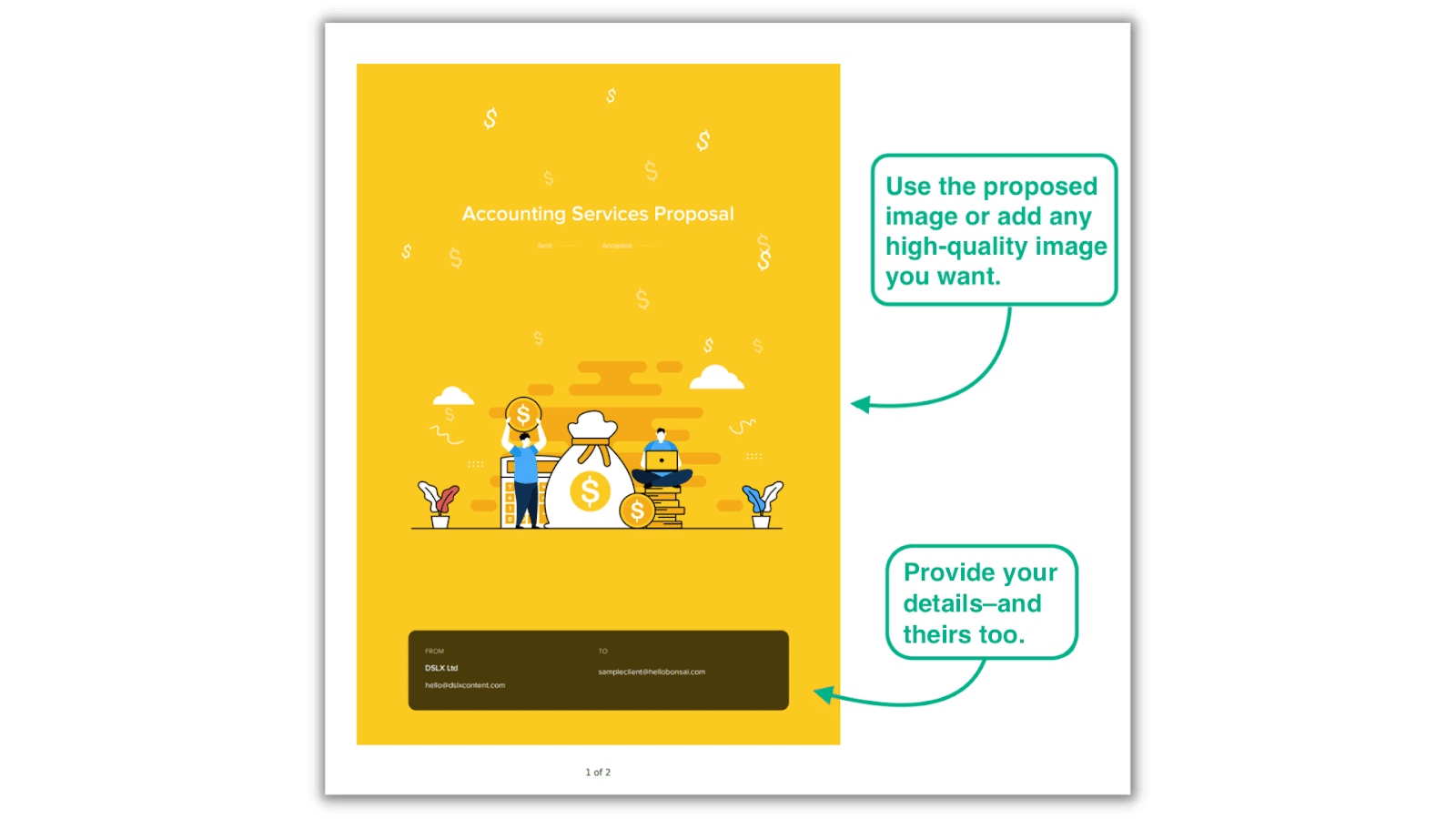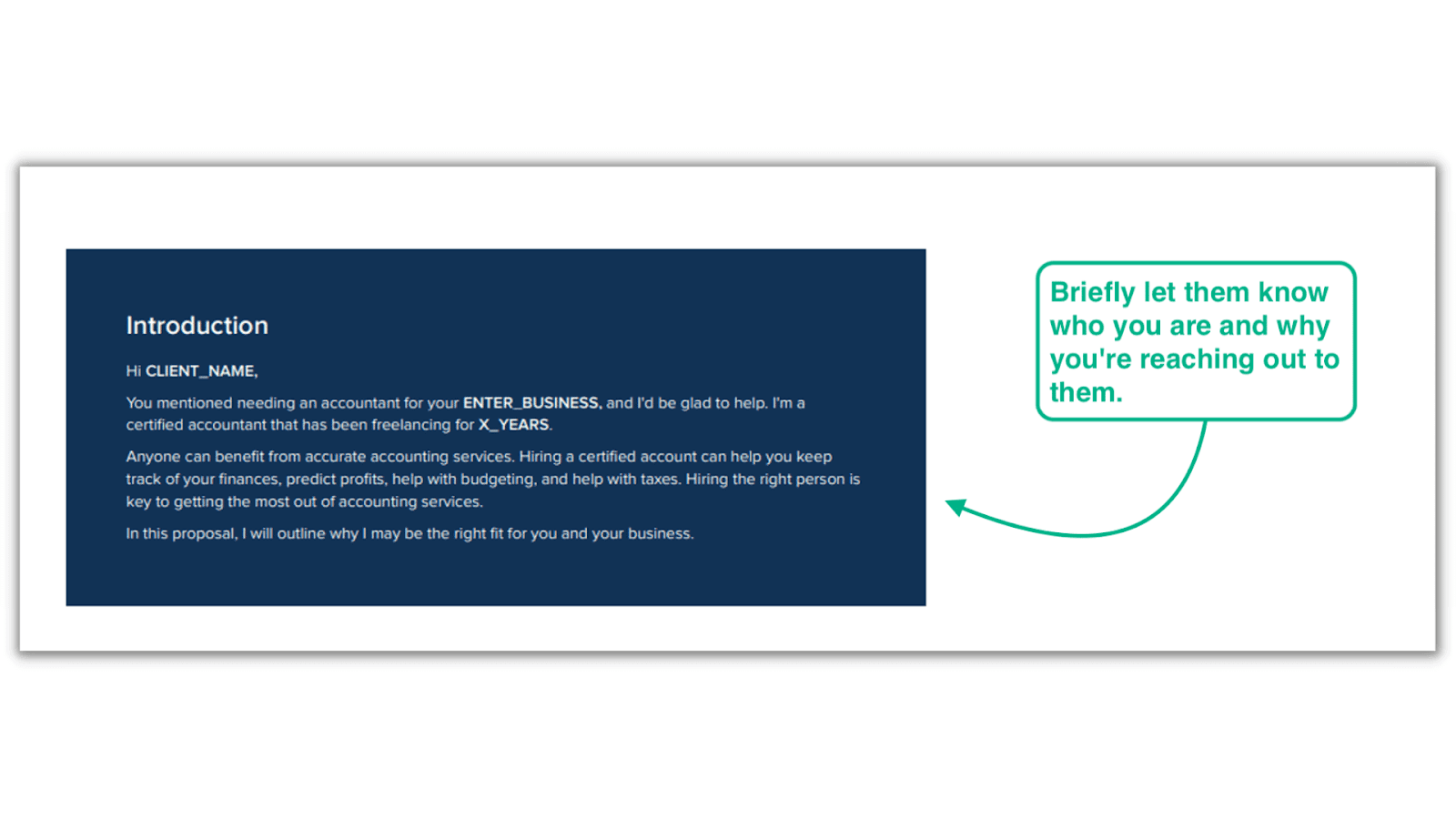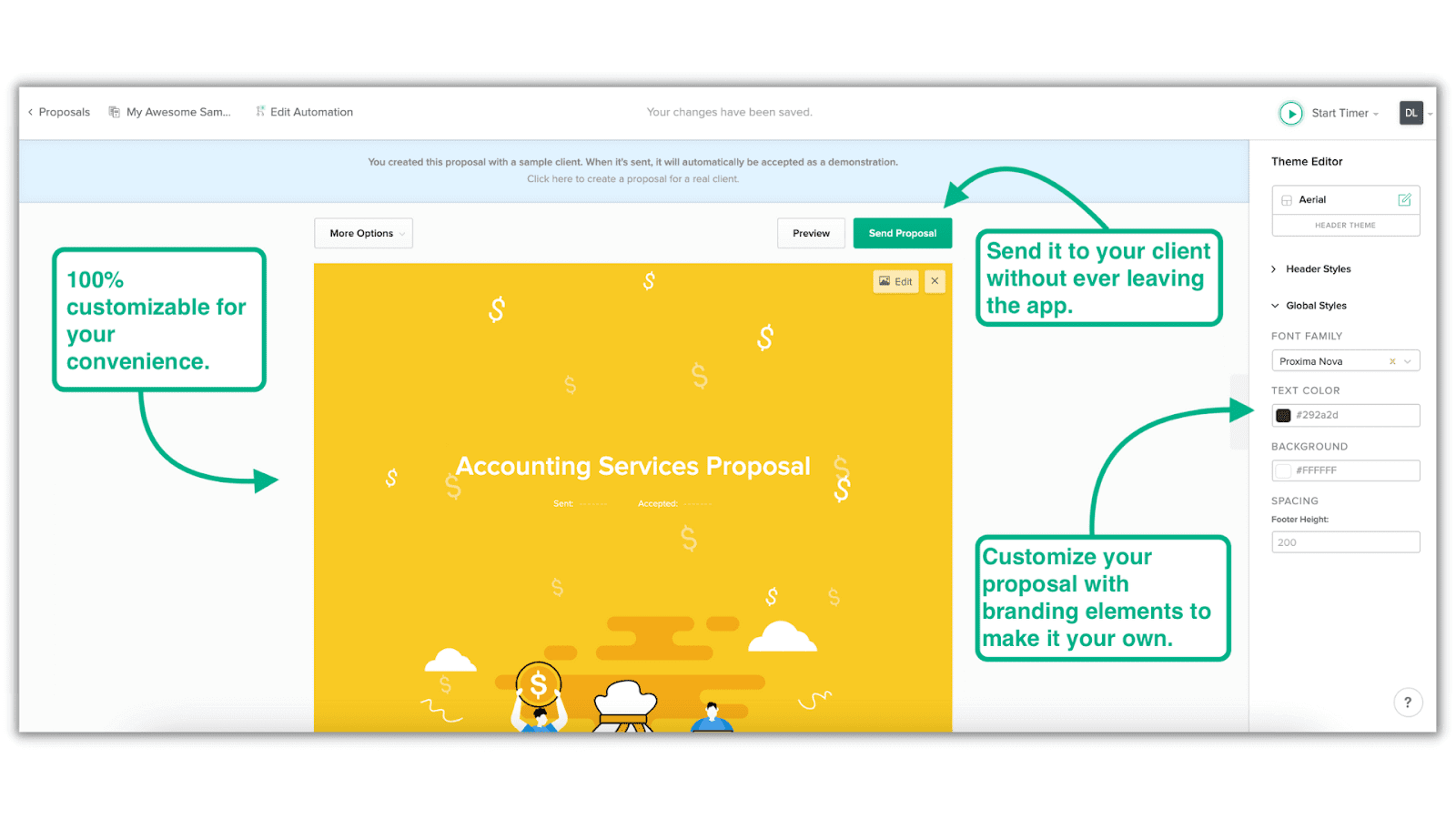
What is an Accounting Services Proposal?
An accounting proposal is a formal business document. An accountant or accounting firm typically uses this proposal to convince a potential client to contract their services for a one-off project or ongoing retainer.
Whether you’re a solo freelance accountant or running an accounting firm, you help customers make sound financial decisions going on their account data. Your proposal is where you’ll need to start showcasing your expertise in day-to-day finances, like accounting, bookkeeping, auditing, payroll services, and advisory services, helping to win you more clients.
Note: Sign up to Bonsai today to create a free proposal using an accounting proposal template. Save time, and win more clients.
What to Include in the Accounting Services Proposal
Getting clients to say “yes” to a proposal is trickier than you think. It becomes even more challenging when you haven’t yet mastered the art of putting one together.
Luckily for you, the secret to winning clients lies in sticking to the basics—add these essential elements to your accounting proposal, and ensure you never miss a gig again.
Title page
A title page is exactly what you think it is. Use this page to mention the project at hand, plus the sender and receiver details.
Don’t think of this as a dull fill-in-the-blank exercise. Instead, write a title that’s easy-to-understand, attention-grabbing, and relevant. Consider adding eye-catching images to make your proposal appealing and noticeable—it’s a great first impression.

Cover letter
A cover letter is your first chance to connect with a client. Write a brief and high-level project statement that summarizes the client’s pain points and your proposed solutions. Start with a conversational tone and make a point of being persuasive.

Here are some pointers to keep in mind when writing a cover letter:
- Personalize: by putting the focus on the client
- Show your expertise: to establish that this isn’t your first rodeo
- Talk about the solution: with concise, relevant, jargon-free, and high-level details
- Show what you’ve done: with previous works, awards, or proprietary processes
- Explain what’s next: so that clients know what to expect throughout the proposal
This gives clients an idea of what you’re proposing, and allows them to get a brief overview before diving into further details.
Executive summary
This section helps you seal the deal. It’s about selling the proposed solution and convincing clients you’re a better choice. The purpose is to pique client’s interest and grab their attention with an overview of your proposed solution—so make it count.
Services
Want to edge out the competition? Show clients what you’re made of, and where you excel. Use this section to showcase what you do, what sets you apart, and the impact of your offerings.
Consider outlining the different financial support services you and your accounting team offer, and how they offer value to clients:
- Bookkeeping: to create and organize accounting department reports on balance, profits, and potential losses
- Financial consulting: to offer a 360 view of financial information
- Payroll management: to manage staff financial statements, including wages, bonuses, salaries, and deductions
- Tax preparation: to avoid tax errors, find credit opportunities, and reduce adverse consequences
- Financial assessment: to evaluate cash account financial data for business stability
- Regulatory compliance: to check an organization’s potential conformance with rules, taxes, laws, and regulations
This way, the client has a strong understanding of what you can offer their business.
Bonsai top tip: Need help managing your own accounts? Check out Bonsai Cash, the ultimate business account for freelancers and small business owners.
Pricing
Which page would a prospect flip to first after receiving a proposal or quote?
Realistically speaking—it’s likely to be the pricing plan. Budget’s a big deal, and a big factor in your client’s decision-making process.
Accounting freelancers can be lured into the trap of lowering fees in the hopes of winning clients. The problem with this approach is that you can neither scale nor profit from your business, and you’re not doing yourself the service you deserve.
You want to create a pricing plan that both you and the client are happy with. Additionally, create a pricing table and provide clients with the flexibility to choose from a range of options.

Popular pricing models include:
- Hourly rate: based on the total number of hours spent on project-related tasks
- Daily rate: depending on the number of days required to complete a project
- Agile rate: to charge per project sprint: for example in the run-up to year-end
- Fixed rate: a set fee for completing the project or for a monthly retainer
It’s a good idea to discuss this with clients beforehand to get a better understanding of what’s realistic for the company and your business.
Terms and conditions
Clearly defined proposal terms and conditions come in handy when things goes off the rails—not that you expect them to. They help you protect your accounting firm and establish a healthy, long-term relationship with new clients.
Here’s what to add in this section:
- Payment terms: mention how any late or missed payment will be handled
- Privacy: outline how you store and protect data
- Intellectual property (IP): mention how you’ll assign IPs created during the project back to the client
- Sharing work: specify whether you’ll be showcasing client work on portfolios, case studies, and competitions
- Changes: define how you’ll manage change requests and if you’ll offer a periodic review
- Cancellation policy: outline notice period for project cancellation and if you’ll charge a cancellation fee
This not only helps protect you, but it also helps protect the client.
How to Write an Accounting Services Proposal
Writing winning proposals comes down to personality and flair. Pricing also plays a huge role, but if you’re in budget then prospects are looking for something more.
In order to stand out to clients as they review multiple proposals, you need to combine emotion, context, and social proof while writing proposals.
Since you already know what sections to add, here’s how to approach writing your proposal. Alternatively, you can use an accounting proposal template or related templates to make life simpler.
Find out exactly what the client wants
Get on a quick call or schedule a meeting to understand prospect’s accounting needs, motivations, and aspirations behind a project. This will help you stay true to the context, while adding the right amount of emotion and social proof.
Highlight what sets you apart
Social proof builds trust—that’s why you need to include it to create better proposals. Here’re a few ideas for you to consider:
- Case studies: that your target customer can relate to
- Numbers and statistics: to portray how a business has benefitted from your services
- Customer testimonials: to showcase reviews from happy customers
- Accounting expertise: to mention your credentials, specialized licenses, certifications, and other qualifications
- Ratings: to provide relevant information from service review portals
Creating an Accounting Proposal is Simple with Bonsai
Creating a proposal isn’t easy—whether you’re a pro or just starting a new business. It takes time, dedication, and research to develop a stellar proposal.
The good news is you can speed up the process with Bonsai’s simple, polished, and customizable accounting service proposal templates.
Here’s how to get started:
- Sign up for free to Bonsai
- Find an accounting services proposal sample template
- Easily modify it as per your needs

Join the 500,000+ freelancers and SMBs already using Bonsai’s gallery of hundreds of sample proposal templates to win new clients.
Accounting Proposal FAQs
What is an accounting proposal?
An accounting service proposal is a document that accountants use to persuade potential clients to opt for their services. An effective proposal addresses clients’ pain points, outlines services, and mentions pricing with terms and conditions.
What services do accounting freelancers offer?
Accountants usually offer services such as:
- Bookkeeping
- Financial consulting
- Payroll management
- Tax preparation
- Financial analysis
- Regulatory compliance check
If you’re an accounting freelancer sending proposals to clients, use a simple and customizable accounting proposal template on Bonsai.





